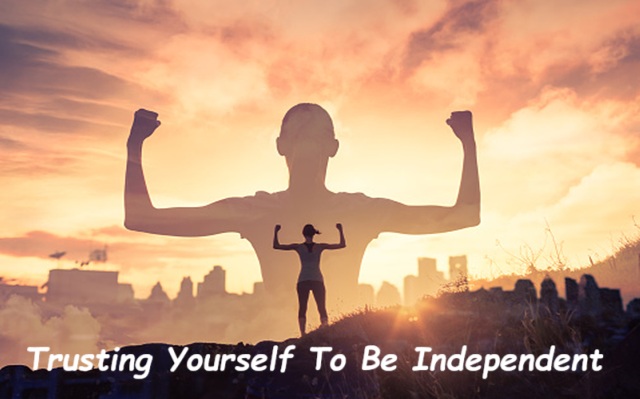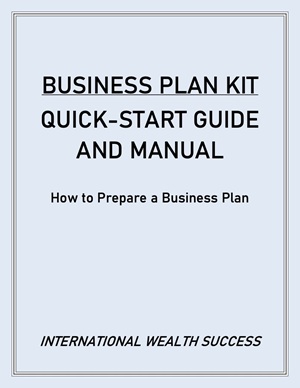Trusting Yourself
In the last chapter, we looked at the concept of independence. A lot of information was unpacked and it was established what independence is and why it’s important. We learned that, ultimately, independence is based on interconnectedness. This means that a truly independent individual is someone who makes decisions based on their own internal beliefs and is not swayed by external forces. At the same time, someone who is autonomous also understands that “going your own way” doesn’t mean cutting your ties to the rest of humanity. Instead, the decisions that are made are solidly based on that person’s responsibilities and duties, as he or she understands them.
In this chapter, we’re going to take a look at one of the main concepts that underpin the process of building greater personal independence – trust, specifically trust in yourself. To be truly independent, you must be able to have a high degree of confidence in your abilities and in your judgment. In this article, we are going to look at ways you can increase your level of self-trust so that you can also boost your level of personal independence.
Why is Self-Trust Important?
The philosopher Bertrand Russell once said, “The whole problem with the world is that fools and fanatics are so certain of themselves and wiser people so full of doubts.” This quote demonstrates the importance of self-trust when it comes to independence. You don’t simply need to trust that you’re right. As Russell wisely points out, every fool and fanatic are convinced that they are right. No, trusting yourself consists of more than an assurance of being “right”. Instead, real self-trust involves looking within and becoming aware of the mental foibles that allow people who are in the wrong to be able to convince themselves that they are right.
In the last chapter, we discussed how independence involves a certain amount of rationality and rigor. Developing and improving self-trust involves a similar process. Your ability to trust in yourself is guided by more than simple self-assurance. It requires that you use critical thinking on yourself in order to determine the true motivations behind your desires and established goals. As the saying goes, “An unexamined life is not worth living”. Without examining the “why” that lies behind the “what”, you condemn yourself to a potential series of mistaken actions that only serve to undermine your confidence.
This is the main reason why developing a solid sense of self-trust is so important. It not only prevents you from rushing through life as a “fool or fanatic”, it also serves as a bulwark against the doubt and misgivings that can come from the inevitable failures that occur along the way.
Look at it this way, all of us have goals in life. Very often, the biggest of those goals are the ones that will bring us the most pleasure and the greatest fulfillment. This means that accomplishing these big goals is an important way to live more fully and to grow as a person.
Big goals, by their very nature, involve time, energy, and multiple preliminary steps. Like Rome, they are not built or, in this case, accomplished in a day. They can take years to achieve. Of course, throughout this time, numerous pitfalls, distractions, and traps have to be negotiated. This means that there are multiple opportunities to fail. Every failure can be a blow to self-confidence and positivity. Each misstep has the potential to undermine the entire process of achieving the goal. There has to be some type of personal or emotional ballast that keeps you on an even keel, staying the course toward your dreams.
Self-trust is that ballast. Having a rational and reasonable belief in your plan of action allows you to continue moving forward despite the setbacks that you are bound to encounter. This is critically important to personal success. The vast majority of people never reach their chosen goals because they are torpedoed by the natural process of making mistakes. To them, achieving a goal seems to be a pristine and almost holy process. They think that success is about perfection when the opposite is true.
We learn from our mistakes. Every success is built upon multiple errors, missteps, and false starts. There is no way to succeed except by the process of trial and error. By failing, we learn. Self-trust allows us to internalize what we have learned and have the confidence and positivity to move forward putting our newfound experience to work. We achieve our big goals by building blocks out of our smaller failures. When you trust yourself, when you believe in your ability to reach your goals, you cannot ever really fail. Self-trust is like a Teflon coating that prevents failure from sticking to you and defining who you are. This is why self-trust is so vitally important to achieving true personal independence.
How to Develop and Grow Self-Trust
We’ve seen that self-trust is essential to both success and the independence that success tends to bring. In this section, we’re going to look at some of the things that you can do every day to begin to develop and grow a solid trust in yourself and your ability to successfully navigate the shoals that stand between you and your big goals.
Remember, these steps mostly deal with breaking bad mental habits and replacing them with new ways of thinking and looking at yourself and the world around you. Because of this, there may be a degree of discomfort involved when you initially try them. Don’t be put off by that discomfort. To increase the trust that you have in yourself, you may have to get rid of behaviors that up until now have held you back. Persevere and remember that the discomfort will fade and be replaced by a renewed sense of positivity and confidence.
Failing is Not a Failure
No one likes to fail. When we don’t succeed, it’s not a good feeling. The doubt, misgivings, and overall negativity that comes along with failing can very rapidly undermine our ability to believe in ourselves. Without that belief, that essential trust in yourself, it can be impossible to pick yourself up, dust yourself off, and get back in the game. At times like these, you have to remember that failing does not make you a failure.
Oscar Wilde said that “experience is a name that we give to our mistakes“. Truer words could not be spoken. Experience requires failure. It is the only way that we, as human beings, are capable of learning. We are supposed to initially fail at anything we attempt so that we gain the experience that is necessary to succeed. This is the way of the world. Failure is the mother of success.
This is a truth that you must internalize if you wish to become independent. When you believe that the only way to truly succeed is to by passing through failure, you begin to develop the self-trust in your judgment that will become your ballast.
The takeaway here is that you must learn to never internalize failure. Failure does not scar you for life. It does not make you a bad person. It does not have the power to change the course of your life unless you let it. There are no rules in the game that we call life and there are as many different paths to success as there are people who are willing to achieve that success. Failure is a teaching point. It is an indication that you need to do something differently. It is not an endpoint. It is a new beginning.
Forgive Yourself
As we just discussed, failure is an integral part of success. As such, it is necessary to fail in order to succeed. This means that when you fail you have to be able to forgive yourself. We all make mistakes and we make them all the time. After all, we are only human and to err is human. So, if making mistakes is a part of being human, so to must forgiveness also be a part.
Too many people use the mistakes that they’ve made as evidence that they are not worthy of success. They dwell on the fact of the mistake and ignore the lesson that dwells beyond the fact. In some sense, you could say that they take their mistakes at face value and ignore the real value contained within the process.
Excuse the pun, but this is a mistake that you don’t want to make. In order to be truly independent, you must learn to let go of the self-created baggage that you’ve been dragging around. It is simply dead weight that is holding you back. Punishing yourself will do nothing but continue to hold you back and block you from developing the trust in yourself that you will need to succeed.
Make Promises to Yourself and Keep Them
Many people are unable to trust themselves because they have been burned by their inconsistencies in the past. Let’s face it, trust is an earned commodity. It can only be given to someone who has shown that they are worthy. Look at your behavior on this point for guidance. Why do you trust someone? It’s simple. You trust someone because they have proven over time that they can be trusted. In other words, they have developed a track record with you that demonstrates that they are safe to trust. You feel safe because their past behavior demonstrates that you will not be harmed in the future.
The same process holds true when you are developing trust in yourself. Look back over your past behavior. Have you made promises to yourself that you haven’t kept? Were there resolutions that ultimately ended up going nowhere? Do you talk a good game but end up not following through? If any of this is true, it is an important reason why you are having problems trusting yourself. It may hurt to admit it, but your overall behavior to yourself is largely untrustworthy.
It is not difficult to turn this situation around. All you have to do is start acting like you are worthy of trust. Treat yourself like you expect the rest of the world to treat you. Don’t lie to yourself. Don’t make promises that you don’t intend to keep. Be honest. Do what you say you’re going to do. Be dependable. Be on time. Be a person who can be trusted. When you do, you will be amazed at how your confidence in yourself will soar.
Surround Yourself With People Who Keep Promises
You’ve probably already heard the statement that you are defined by the company you keep. That statement is true because, as people, we tend to learn by example. Therefore, if you are surrounded by dishonest people, you will tend to become inured to dishonesty. You won’t initially become dishonest yourself. You will simply get so used to dishonesty that it loses the power to shock you or cause you affront. In short, you get used to it. You even begin to expect it. Over time, you may find yourself becoming more and more comfortable with your dishonest behavior. After all, how bad could it be if everyone around you is doing it?
As human beings, we are consensus builders. We appreciate congruence and we abhor chaos. So, behavior-wise, we tend to imitate the behaviors that we see around us. It doesn’t matter if these behaviors are good or bad. It doesn’t matter if we agree or disagree with the behaviors. In the end, we will try to build consensus and bring congruence to the situation by imitating what we observe. That doesn’t mean that if we are surrounded by murderers we too will murder. What it does mean is that our reaction to murder will be much more muted than someone who hasn’t had exposure to that particular behavior. In short, human beings can get used to any situation if exposed to it long enough.
Therefore, you need to surround yourself with trustworthy people. When you do, you will find that you will begin to expect more out of yourself. It will be harder to miss an appointment, tell little lies, or make promises that you don’t keep. In other words, you will become more trustworthy, and, as a result, you will begin to trust in yourself more.
Next Chapter >>>>>>
How have you managed Self-Trust?
Share Your Experiences Below











